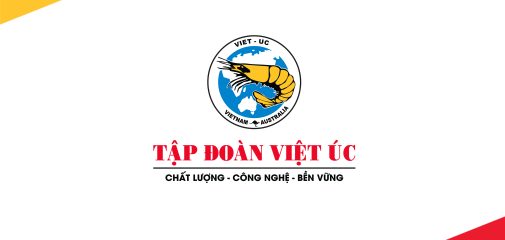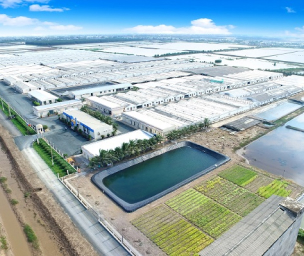With more than two decades of working in the seafood industry, Mr. Luong Thanh Van – Chairman of the Board of Directors of Viet Uc Seafood Corporation has always been a pioneer in promoting the Vietnamese shrimp industry towards self-reliance and sustainable development. Let’s listen to him share about the challenges, opportunities and strategies shaping the future of the shrimp breeding industry in Vietnam.


Mr. Luong Thanh Van: I arrived in Australia at the age of 18 and started my life in a foreign land. In the early years, I worked in the garment industry, before switching to the field of photo processing and sticking with this industry for 25 years. That was the golden age of traditional photo printing. But when digital technology exploded, this market quickly narrowed, forcing me to find a new direction.
Once when I returned to my hometown Bac Lieu to celebrate Tet, I was surprised to see people “racing” to raise shrimp. Seeing people struggling to make a living, I realized that this was not only a traditional profession but also had great potential in the future. I asked myself: “Why not try shrimp farming?” If I did well, I would not only open up a new path for myself but also contribute to helping people improve their lives and increase production efficiency.
In 2001, I decided to start a business with shrimp. At that time, black tiger shrimp was still the main farming object. Later, when whiteleg shrimp became popular, I shifted my focus to this shrimp breed. I started with the seed, because in my opinion, the seed is the “soul” of the farming season, deciding more than 50% of the success. As people often say: “First seed, second knowledge” to emphasize the core role of seed in shrimp farming.
Although I do not come from the aquaculture industry, I always strive to learn from experts and research institutes at home and abroad, proactively inviting experts to transfer technology and advanced farming techniques, then applying them in practice. Up to now, after 23 years of commitment, I am still steadfast in my goal of providing high-quality seed, helping people improve productivity, develop sustainably and bring the Vietnamese shrimp farming industry to the international market.

Mr. Luong Thanh Van: The shrimp industry is a potential but also challenging field, especially in the seed segment. With complex biological characteristics, shrimp breeds are very small and live underwater, control has never been easy. Success depends on many factors such as the environment, diseases and unpredictable market fluctuations.
When I first entered the profession, I faced countless difficulties. This profession requires meticulousness, perseverance and constant learning. There were times when I wanted to give up. At that time, in Vietnam, shrimp farming techniques still depended heavily on folk experience, lacking the support of modern science and technology.
I realized that, to be successful, we cannot rely on old ways but must change. Passion is important, but not enough; what is more necessary is determination and the spirit of continuous learning. I spend a lot of time researching, inviting domestic and foreign experts to transfer technology, gradually applying scientific and technical solutions into practice. There are many people who have been successful in shrimp farming but then failed because they refused to change. They cling to their old successes, not updating new technologies in time while the world is always moving. To go the long way in this profession, the first prerequisite is passion, determination, the spirit of learning and especially the courage to change. Only by boldly innovating and applying modern technology can we overcome challenges and develop sustainably. The Vietnamese shrimp industry still has a lot of potential and I believe that with innovation and determination, we can go further on the world seafood map.


Mr. Luong Thanh Van: One of the decisions that I am most proud of is proactively producing parent shrimp in Vietnam. Previously, our shrimp industry was almost entirely dependent on imported parent shrimp from abroad. At that time, the export value of the shrimp industry had reached 2-3 billion USD, but we did not have the right to be proactive.
When importing parent shrimp from abroad, the risk is very high. We cannot check the quality before buying, but only when receiving the goods do we know the condition of the shrimp. This poses many potential risks for both farmers and businesses.
I realized that if we cannot control the source of parent shrimp, we will forever depend and suffer losses. Therefore, I went to research institutes. Here, we cooperated to transfer parent shrimp production technology. To date, Viet Uc is the first and only corporation in Vietnam to control the source of parent shrimp domestically.
This decision not only helps us be more proactive but also reduces risks for the whole industry. Typically, during the COVID-19 pandemic, when international transportation routes were cut off, importing broodstock was almost impossible. But thanks to the source of broodstock produced domestically, we still ensured stability and no interruptions.
Looking back, I am really proud of that decision. Not only does it help the business develop sustainably, but more importantly, it also creates different values for the shrimp farming community, ensuring the initiative and safety of the whole industry during the most difficult times.

Mr. Luong Thanh Van: The biggest challenge facing the Vietnamese shrimp seed production industry today is disease. Although difficult to solve, this problem can be completely overcome if we follow the correct procedures. Ensuring biosecurity is a key factor, along with selecting shrimp families with good disease resistance to ensure that the seed is disease-free, healthy and develops stably.
Previously, when I first returned to Vietnam, there were only a few types of shrimp diseases, but now there are dozens, while environmental and weather conditions are increasingly harsh. This requires shrimp farmers to be flexible and continuously improve production methods.
Ecuador is currently farming shrimp using an extensive method with low density, which helps reduce costs and has advantages in output and price. This puts a lot of pressure on shrimp exporting countries, including Vietnam. To compete, we need to focus on improving the quality of shrimp seed, optimizing growth rate and survival rate.
However, the Vietnamese shrimp seed production industry has made significant progress. During my international business trips, I have found that the quality of our shrimp seed is not inferior to that of other countries.
Many Vietnamese companies have made remarkable improvements, gradually reducing the use of chemicals and antibiotics, and switching to sustainable, environmentally friendly shrimp farming methods. This is a very positive signal.
With the rapid development of science and technology, I believe that if we do not invest in research and technology application right now, we will be left behind.
The current cost of shrimp farming in Vietnam is still high, mainly due to risks in the farming process and unstable survival rates. Therefore, controlling and improving survival rates is an important goal that we, at Viet Uc, are focusing on solving. This is the decisive factor for the sustainability and development of the Vietnamese shrimp industry in the future.
If we follow the right process, ensure the quality of the seed and maintain a sustainable direction, I believe that Vietnamese shrimp will reach international standards. At that time, global consumers will know Vietnamese shrimp as a symbol of quality and prestige.

Mr. Luong Thanh Van: Currently, Viet Uc is developing strongly in the direction of closing the shrimp industry value chain, from parent shrimp, shrimp seeds, shrimp meat, feed factories to processing factories. Thanks to this model, each shrimp when reaching consumers can be clearly traced to its origin, thereby ensuring quality and meeting the strict standards of the international market.
Closing the value chain not only helps improve product quality but also creates conditions for strict control at each stage of production. This is something that some industries in developed countries have done for a long time, but in the shrimp sector, it has not been fully focused on, even though the economic value of shrimp is very large.
I believe that this trend is an inevitable step for the Vietnamese shrimp industry in the future. Today’s consumers, especially the younger generation, are more concerned about health and food quality. They want to know where the products they use come from and how they are produced. This places a higher demand on transparency and traceability throughout the entire production process.
In addition, with the increasingly deteriorating environmental situation, proactive shrimp farming, with strict control of feed and living environment, is the only way to ensure safety and high quality.
Therefore, Viet Uc’s pioneering in building a closed value chain is not only a long-term strategy, but also a breakthrough, contributing to making the Vietnamese shrimp industry ready to compete and meet the increasingly stringent requirements of the international market.


Mr. Luong Thanh Van: In the context of the shrimp industry facing many challenges in production costs and seed quality, optimizing the production process is necessary. However, to reduce costs while still ensuring seed quality, businesses need to apply appropriate scientific and technological solutions.
One of the important solutions is to improve genetics, through selecting parent shrimp with outstanding characteristics such as the ability to eat less, grow quickly and absorb nutrients well. Thanks to the application of modern technology, we can identify and breed shrimp lines with optimal genes, thereby improving farming efficiency.
Reducing costs does not mean reducing quality, but must come from selecting the best breed, ensuring that shrimp have the ability to absorb nutrients effectively and grow quickly. This helps to minimize risks in the production process.
In addition, the application of advanced technologies in production management, optimizing the breeding process and controlling diseases are also key factors to both improve the quality of breeds and ensure profits and maintain competitiveness for businesses.

Mr. Luong Thanh Van: Aquaculture is a field with great potential but also requires a lot of effort, knowledge and close cooperation. For those who want to participate and develop in this industry, I have some advice as follows:
First of all, it is necessary to learn and understand deeply about this field. Shrimp farming, for example, is not simply about stocking and feeding, but also involves biosecurity management, protecting the farming environment and applying modern techniques. Understanding is the key to success and minimizing risks in the production process.
Second, I think cooperation between the state, businesses and people is very important. The state should support through research institutes, universities and organize easy-to-understand instruction programs to provide knowledge to farmers. At the same time, local authorities need to promote the dissemination of safe and sustainable shrimp farming techniques.
Third, the current cost of technology investment is very high, which creates many challenges for people. Therefore, the role of the state is not only to support technology but also to expand the market, remove procedural and regulatory barriers to help Vietnamese seafood products compete better in the international market. Finally, the younger generation needs to boldly approach new technology, innovate in their ways of doing things and be ready to change. When all parties work together, from the state, businesses to the people, I believe that we can build a sustainable and effective aquaculture industry.

Source : thuysanvietnam.com.vn


















